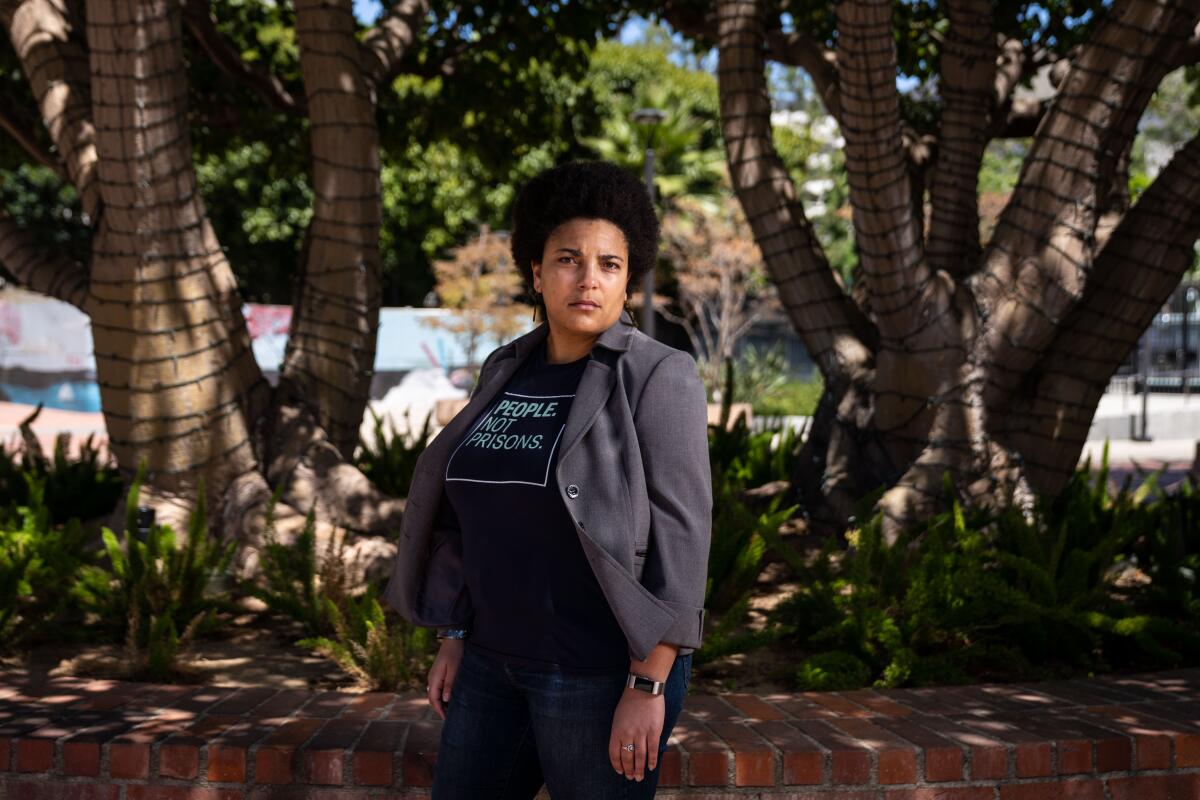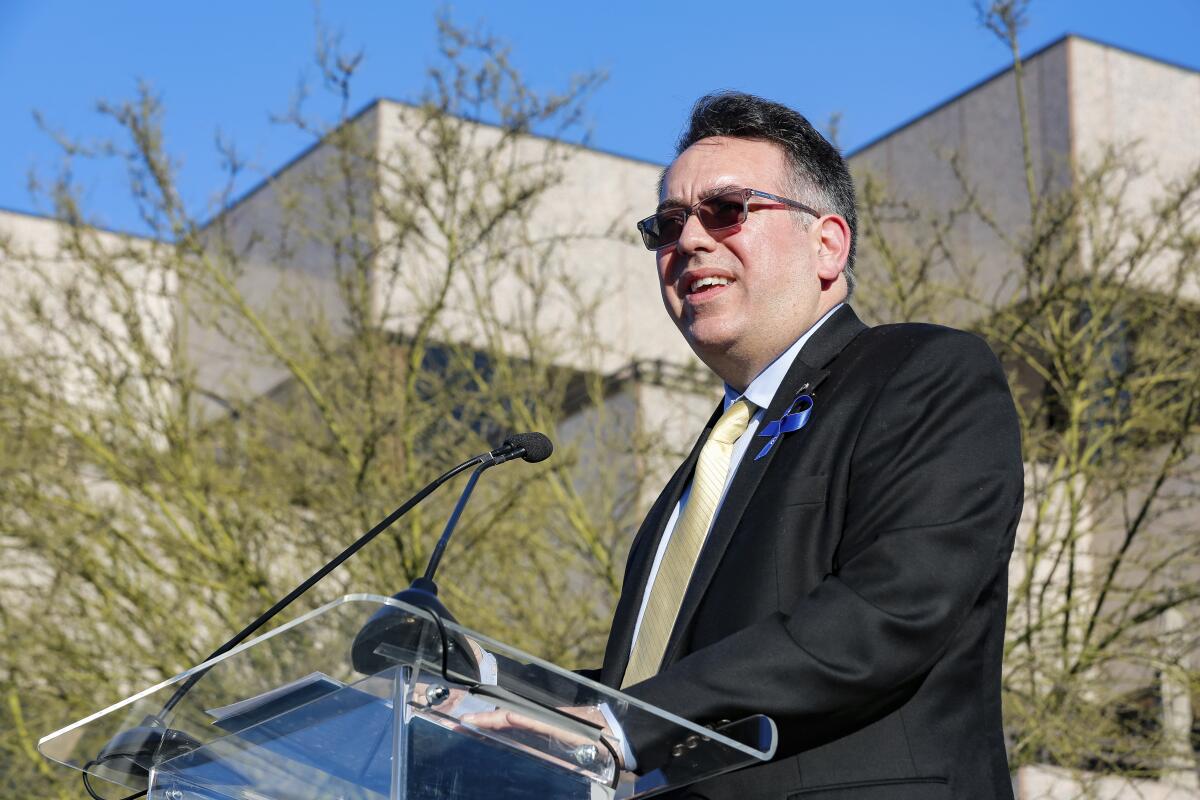Black attorney accuses ACLU of ‘flagrantly racist policies’ in discrimination lawsuit

- Share via
A former staff attorney for the American Civil Liberties Union of Southern California has sued the nonprofit civil rights organization, alleging that as a Black woman, she was subjected to retaliation and discrimination for repeatedly complaining about systemic racism in the workplace.
In a lawsuit filed Tuesday in Los Angeles Superior Court, Sarah O. Clifton contends she was labeled as “angry” or “aggressive” for raising racial equity issues, endured an angry outburst from the ACLU’s executive director at a staff meeting, and that to compensate, she had to act “overly polite” in dealing with a boss who was seemingly afraid of her.
“[Clifton] purportedly was fired for being nothing more than an ‘angry black woman’ — a tired old racist stereotype that even mainstream publications have since caught on and written about,” the 20-page lawsuit states.
She was terminated in February and offered a severance package that required arbitration to handle disputes.
“The hypocrisy is rich given that the ACLU at a national level has always taken a public stance against ‘forced arbitration,’” according to Clifton’s lawsuit, which cites an article published by the ACLU that lists the pernicious effects of arbitration agreements, among them preventing harassment and discrimination cases from ever seeing the light of day.
“We filed the lawsuit with careful consideration and multiple attempts to try to reach an amicable resolution,” said Clifton’s attorney, Kevin Chiang.
David Colker, a spokesman for the ACLU of Southern California, said in a statement, “Our policy is not to comment on pending litigation that involves private personnel matters.”
The lawsuit comes as the vaunted civil rights organization has seen a surge of membership and has positioned itself at the vanguard of the anti-Trump resistance, vigorously defending reproductive freedom, voting rights, a free press and the rights of immigrants. The organization has also tackled abuses in L.A. County’s jail system, and most recently has taken on the cases of arrested protesters.
Last week, the ACLU joined with Black Lives Matter L.A. in a lawsuit that accused the Los Angeles Police Department of violating the rights of protesters during demonstrations against police brutality and the death in Minneapolis police custody of George Floyd. The civil rights organization also joined with Black Lives Matter to sue the cities of Los Angeles and San Bernardino as well as law enforcement agencies, saying the curfews imposed during the unrest violated 1st Amendment rights.
In her lawsuit, which also names executive director Hector Villagra, Clifton accused the ACLU of “using the plight of Black folks purely for self-interested gain” and “allowing flagrantly racist policies and procedures to reign supreme.”
Clifton, a graduate of USC’s Gould School of Law, is the daughter of O. Rogeriee Thompson, a federal judge on the U.S. 1st Circuit Court of Appeals in Boston. Her late father, William C. Clifton, was a longtime judge in Rhode Island, and her suit contends she “selflessly eschewed her privilege” to pursue public interest law rather than lucrative corporate work.
The ACLU hired her in 2018, and initially she was to work for Peter Eliasberg and another attorney, but Clifton said she was instead reassigned to work for Jessica Farris, who oversees criminal justice and drug policy. An ACLU spokesman did not make Farris available for comment.
Clifton accused Farris of having “an actual, irrational fear towards her.” Farris initially gave her a “sub-par” performance review, but when Clifton pushed back, the evaluation was revised to “exceptional” in all categories. The lawsuit includes details of the positive performance review, which praises her for succeeding while facing “a multitude of unusual and difficult situations.”
She contrasted the positive evaluation with her termination letter and highlighted discrepancies. She was accused of being “disruptive” and “insubordinate,” alleging she resisted checking in with her supervisor and failed to properly supervise interns. As a rebuttal, Clifton included positive testimonials from former interns.
Other instances of racism followed, she alleged. At an ACLU National Conference in 2019, a speaker exhorted delegates to root out “white supremacy.” Clifton said she gathered with Black women from other ACLU offices who attended the conference and said she “was shocked to learn that all of them had experienced some form of systemic or institutionalized racism.”

Back in L.A., Clifton’s suit claimed that at an all-staff meeting last year, Villagra and other managers presented the ACLU’s “mission statement” on equity and inclusion. At the end of the presentation, Clifton said she inquired about where “the real change” was with respect to racial equity.
“Mr. Villagra blew up, lost his temper, and started yelling and arguing with [Clifton] in front of everyone. He also tried to cross-examine her, asking her to provide empirical evidence for her arguments,” the lawsuit states.
Staff members texted one another about Villagra’s alleged outburst, the suit says. One colleague drafted a petition that called for greater equity and expressed how staff were frustrated with the pace of change, according to the suit.
Villagra eventually apologized in a staff email and vowed to do better, the lawsuit said. An ACLU spokesman did not make Villagra available for comment.
By then, the ACLU had retained an investigator to review Clifton’s complaints about systemic racism.
The organization terminated her on Valentine’s Day, in the middle of Black History Month, she said in the suit, and offered $48,000 in severance along with an agreement to arbitrate disputes confidentially. Clifton declined.
More to Read
Sign up for Essential California
The most important California stories and recommendations in your inbox every morning.
You may occasionally receive promotional content from the Los Angeles Times.














